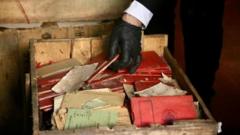In an astounding rediscovery, workers clearing out the basement of the Argentine Supreme Court uncovered crates filled with documents from Nazi Germany. These historical artifacts emerged as part of preparations to relocate the court’s archives to a new museum, prompting a significant interest in their implications.
The documents arrived in Argentina on June 20, 1941, through 83 diplomatic pouches sent by the German embassy in Tokyo via a Japanese steamship. Argentine customs officials intercepted the shipment after discovering Nazi propaganda materials among the pouches, leading to the confiscation of all the items later that year.
During the recent archival work, the wooden champagne crates caught the workers' attention, leading them to open one and uncover material aimed at promoting Adolf Hitler's ideology within Argentina during World War II. The court promptly secured the crates and enlisted the help of the Buenos Aires Holocaust Museum to categorize the discovered items, which included black-and-white photographs and membership booklets emblazoned with swastikas.
Historians expressed optimism that these rediscovered documents could provide insights into Nazi financial operations and their global connections. According to a statement released by the Argentine Supreme Court, the German embassy had originally declared the documents as "personal effects." However, due to the suspicions raised by the substantial shipment, Argentine officials opened a sample of the pouches, wherein the problematic materials were found.
Despite requests from the German embassy in Buenos Aires for the return of the pouches, an Argentine judge ordered their seizure in September 1941, leaving the Supreme Court to decide the fate of the materials. With no resolution reached by 1944—after Argentina severed ties with the Axis powers—the crates remained in obscurity in the court’s basement for decades.
Post-World War II, Argentina became known as a haven for prominent Nazis, including figures like Adolf Eichmann and Josef Mengele. As historical scrutiny continues, the incident raises essential questions about the nation’s complex legacy concerning its wartime neutrality and the harboring of war criminals. In 2000, former President Fernando de la Rúa formally apologized for Argentina's role in providing refuge to Nazi war offenders, reflecting the ongoing need to confront and understand this troubling past.


















